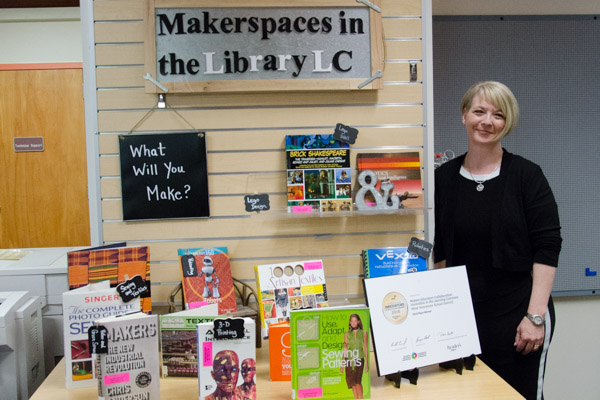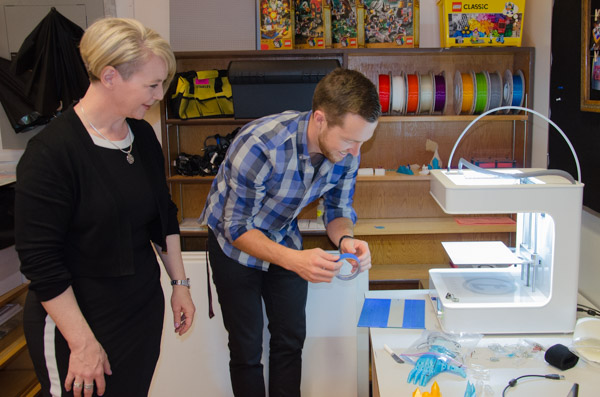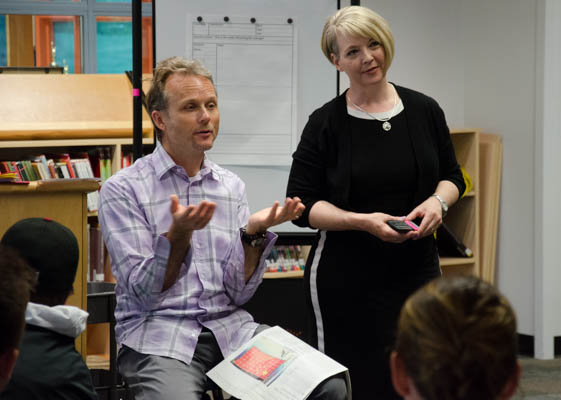This changes everything
June 22, 2017 - 10 minutes read We’ve probably all heard about teachers who have an amazing capacity to transform lives, but have you ever heard of one that goes about it by transforming the very spaces in which students learn? Michelle Davis, a Teacher-Librarian who shares her time at both Gleneagles Elementary and Rockridge Secondary schools, has done just that, by putting research into practice, in less than three years with the district.
We’ve probably all heard about teachers who have an amazing capacity to transform lives, but have you ever heard of one that goes about it by transforming the very spaces in which students learn? Michelle Davis, a Teacher-Librarian who shares her time at both Gleneagles Elementary and Rockridge Secondary schools, has done just that, by putting research into practice, in less than three years with the district.
While researching the evolution of the library for her second graduate degree last year, Michelle was fascinated by the potential of the Makerspace – a ‘do it yourself’ design lab, where people can gather to create, invent and learn – to turn a library into a creative learning commons, where tools are available to all.
Last year, Michelle initiated a Maker Educators’ Collaborative1, applied for and received one of the district’s teacher innovation grants and together they created the district’s first makerspaces at Rockridge, Caulfeild, Gleneagles and Eagle Harbour Montessori schools. The work she did with the collaborative won the team a highly coveted Canadian Innovators in Education award from the Canadian Education Association in 2016, and the project was soon featured in Readers’ Digest.
“For me, with all of the research I’ve done, I’ve learned I’m really passionate about the equitable access this provides for all students in the library, whether it’s course related or not. We have acquired six new VEX IQ Robotics sets, podcasting equipment, Lego and a new 3D printer, and I’m just thrilled to see how students and staff are using the space.”
The idea is a hot one, spreading even further this year to include a new Makerspace in the library at Rockridge Secondary school, and a lab space at West Vancouver Secondary school. While surveying Rockridge students about the resources they wanted to see in the new space, one student looked at her incredulously and asked, “So, this is going to be like a ‘cool’ library?”
 It is definitely cool now. Resources are constantly being checked out and students are booking the space for everything from filmmaking to creating battery operated cars. Teachers are using this new resource to work in many subject areas, all threaded together by the creativity fuelled in the space, and through the tools now available, like the 3D printer.
It is definitely cool now. Resources are constantly being checked out and students are booking the space for everything from filmmaking to creating battery operated cars. Teachers are using this new resource to work in many subject areas, all threaded together by the creativity fuelled in the space, and through the tools now available, like the 3D printer.
“The gist of 3D printing is that it is additive manufacturing – you can create plastic objects by building up in layers,” explains Rockridge math teacher Michael Rudolf. “The printer is like a motorized hot glue gun that ejects melted plastic in very fine layers. Our printer uses PLA [PolyLactic Acid], which is an environmentally friendly, biodegradable plastic made from corn products.”
Michael is working together with students on a project through Enabling the Future. The group is building a 3D printed prosthetic hand that they will send back to the organization to connect them with someone who might benefit from a wrist-assisted 3D printed prosthetic.
“All designs are open-source – anyone can download them, tinker with the files and re-upload them to share with others,” says Michael.
Michael also accesses the space with his Math 11 AW (Apprenticeship and Workplace) students. Many of them benefit from alternative methods of instruction that are more hands-on. The students create sculpture designs using basic geometric shapes, which they can then print out and keep.
“The whole notion of the Makerspace is driven by connection,” explains Michael, who has students sharing with other students what they’re excited about. “It has been cool to show a few students how to 3D print and then have them teach others… or show staff and have them show others what they have learned. I started this year having zero experience with 3D printing and learning along the way, and so it has been an exciting endeavour for me as well!”
In addition to her work on the Makerspace innovation projects, Michelle, like all of West Vancouver’s Teacher-Librarians, spends her days collaborating with teachers from many different departments as co-teachers.
 “One of the things that I love the most about my work is that there is no ‘typical’ day,” says Michelle. “At Rockridge, I have co-taught lessons on thinking openly and critically about pipelines in a Science 8 class, where one of my roles was presenting on Media Literacy skills. I have helped to facilitate an Aboriginal picture book unit with English 8 classes, facilitated ‘Speed Dating’ with books events and ‘Read In’ events (with popcorn and pyjamas) and presented on both presentation and story-telling skills in a leadership class. I also enjoy facilitating the use of our new Makerspace resources, such as Lego, the 3-D printer and podcasting equipment, while assisting students with finding information, using databases or locating ‘just the right book’.”
“One of the things that I love the most about my work is that there is no ‘typical’ day,” says Michelle. “At Rockridge, I have co-taught lessons on thinking openly and critically about pipelines in a Science 8 class, where one of my roles was presenting on Media Literacy skills. I have helped to facilitate an Aboriginal picture book unit with English 8 classes, facilitated ‘Speed Dating’ with books events and ‘Read In’ events (with popcorn and pyjamas) and presented on both presentation and story-telling skills in a leadership class. I also enjoy facilitating the use of our new Makerspace resources, such as Lego, the 3-D printer and podcasting equipment, while assisting students with finding information, using databases or locating ‘just the right book’.”
The work looks slightly different at the elementary level, but there is similarly much variation from day to day, and the recent focus on the new Applied Design Skills and Technology (ADST) curriculum has definitely had an impact at both levels in K-12. Working with a primary class, she may help them create a book or introduce robotics in the learning commons. She has helped intermediate students learn to use the Storybird App to create poetry and facilitated primary poetry stations, which include building poems out of Lego, arranging magnetic words on a whiteboard, and using iPads.
“I spent a lot of time introducing robot-themed books, happily dodging robots at my feet while students learned to code a path, and listening to students describe their robotic creations made of playdough, Lego or recycled materials. No day is ever the same, and I wouldn’t have it any other way!”
Michelle, who spent most of her career in independent schools, came to the district in part because West Vancouver is well known for innovation in education, and in particular, has a strong reputation for supporting and encouraging the work done by Teacher-Librarians. Next year, she will focus her time entirely at the secondary level at Rockridge Secondary.
“It’s definitely a challenge attempting to offer both quality Library/Learning Commons programming and new Makerspace (ADST / Science, Technology, Engineering, Arts and Math) programming on two days per week in two diverse schools: one elementary, one secondary.”
Michelle has earned two graduate degrees, one in Educational Technology and Design from the University of Saskatchewan, and the other in English Education (Written Composition/Literacy) from UBC. Her Teacher-Librarian certification is from UBC as well, which she earned following completion of her undergraduate degrees in English and French and a Bachelor of Education from UBC.
Michelle, who resides with her teacher husband and two teenaged sons, says her family and friends know that her work is highly rewarding with all the right ingredients: opportunities to work with students of all ages, to collaborate, innovate, create and pursue her passions.
“If they are short on time,” she says, “they know better than to ask what I’m up to at work!”
Michelle especially appreciates it when parents and students share affirming stories with her, like the mom who recently told her that her son wants to be a librarian when he grows up. Or the dad who wandered through the library one day, closely examining her displays, and then telling her that his daughter displays her books in her room exactly like she does hers.
Her favourite quote came from a Grade 5 student after she introduced robotics for the first time: “I thought I knew what I wanted to do when I grew up, but this changes everything!”